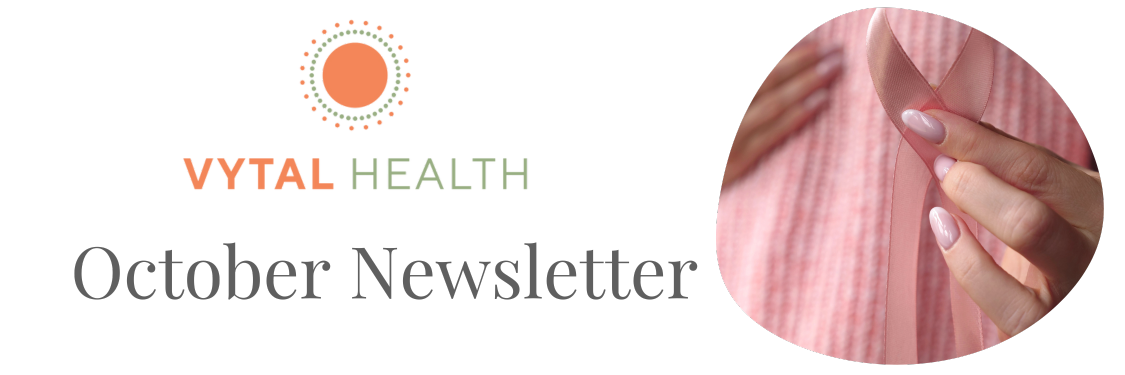Functional Medicine Approaches for Breast Cancer Awareness Month
October is Breast Cancer Awareness Month, and at Vytal Health, we want to take this opportunity to share integrative, functional approaches that can empower you in your breast health journey.
Breast cancer affects many women, and while early detection and conventional treatments are vital, functional medicine offers additional support that focuses on prevention, overall health, and hormonal balance. We’re thrilled to feature insights from Dr. Alicia McCubbins, our hormonal health expert, who believes in a proactive approach to breast health. Here are some key strategies she recommends
Functional Medicine for Breast Health
1. Optimize Hormonal Balance
Your hormones play a critical role in overall breast health. Imbalances in estrogen, progesterone, and other hormones may increase the risk of breast cancer. Dr. McCubbins highlights how functional medicine evaluates these imbalances through comprehensive testing and offers personalized solutions, such as:
– Supporting healthy estrogen metabolism through diet, lifestyle, and supplements. Estrogen
– Using bioidentical hormones when necessary to restore balance with emphasis on laboratory testing for screening and continued assessment and safety. Bioidentical hormones are known to have a more protective impact on the endocrine system versus synthetic hormones (like oral contraceptives). Progestins found in synthetic birth control are very different from progesterone, the actual hormone that naturally occurs even in an herb, wild yam.
– Avoid environmental triggers for xenoestrogens: eat animal products that are raised without hormones. Avoid plastic containers for food and beverages, especially when heating. Evaluate your home for chemicals that can be hormone disruptors by visiting the ewg.org. They have resources for choosing safe personal care products, cleaners, etc
– Optimizing stress hormones (cortisol) along with blood sugars and insulin is integral to a healthy hormone/endocrine balance….
2. Emotional and Mental Health
Managing stress and supporting mental well-being are often overlooked in cancer prevention, yet they are crucial. Chronic stress can dysregulate hormones and weaken the immune system. High cortisol is immunosuppressive, which over time, can increase a risk for cancer. Dr. McCubbins advocates for:
– Regular mindfulness practices such as meditation or yoga.
– Engaging in activities that bring you joy and reduce stress levels.
– Using adaptogenic herbs and complexes to support adrenal health. Talk to your doctor (or Dr. McCubbins) about the right formula for you as herbs and supplements may interact negatively with your medications, genetics, constitution, etc.
– Hormone testing can be done along with adrenal assessment! Salivary, blood and urine testing is available to check in on your cortisol and DHEA levels which can provide a lot of objective insight for “stress management.”
3. Focus on Anti-Inflammatory Nutrition
Chronic inflammation is a known contributor to cancer development. Dr. McCubbins recommends adopting an anti-inflammatory diet rich in:
– Cruciferous vegetables like broccoli and kale, which support estrogen detoxification.
– Omega-3-rich foods, such as fatty fish, flaxseeds, and walnuts.
– Fiber intake is clutch as it promotes efficient estrogen metabolism, ridding the body of toxic overload of estrogens
– Fill up on good fats found in nuts and seeds, avocados, extra virgin olive oil, coconut oil, etc to reduce inflammation, build endogenous hormones and slow tumor growth.
– Eat the rainbow to increase your intake of a wide array of nutrients and antioxidants.
– The Mediterranean diet has the most support in literature for supporting the immune system. For more information check out this review from NIH: Cancer and the Mediterranean Diet (A Review)
In terms of recommended avoidances, Dr. McCubbins recommends eliminating alcohol from one’s diet completely. The idea of 1-2 glasses of wine per day is outdated and does not provide health benefits. According to this study on the NIH website: Alcohol and Breast Cancer – alcohol was the cause of tumor formation in over 50% of women with breast cancer.
Watch your intake of AGEs- Advanced Glycation End Products. These occur when sugar interacts with proteins or fats, damaging cells (oxidative stress) and lead to chronic disease. Reduce exposure by limiting fried, grilled and highly processed foods. Cook with moist heat like steaming, slow cooking and sous vide. Marinating your meats with vinegar or lemon juice can also reduce formation of AGEs.
Detoxification Support.
Functional medicine recognizes the importance of helping your body eliminate toxins that may increase cancer risk. Dr. McCubbins suggests incorporating detoxification support in the light of aiding the body to eliminate efficiently. Consider the body as a bucket with spigots representing digestion (stool), urinary (urine), skin (sweat), emotions (talk/emotional processing), etc.
We are all detoxing all day every day. This is not a novel process in the body. Optimizing your elimination processes is synergistic with supporting the immune system. You do not need highly marketed supplements for “parasite cleanses” and “detox” supplements to accomplish this.
– Drink plenty of water and herbal teas.
– Dry brushing and Castor oil packs (topically) to move lymphatics
– Sweat through exercise or saunas
– Move your body every day, and if exercise is not possible, explore vibration plates as a way to build muscle, strength and again move the lymphatics
– Contrast hydrotherapy– always following heat exposure with shorter bursts of cold (a cool rinse at end of shower, a dip in the cold pool after a hot tub, etc)
– Eat plenty of fiber 30 grams or more daily
– Eat “Foods that love the liver” such as beets, dark leafy greens (dandelion greens for bonus points), turmeric, ginger
– Consider liver-supportive supplements like milk thistle or N-acetyl cysteine (NAC) when discussing a care plan with your doctor
Prevention starts with Screening
About 1 in 8 women in the U.S. will be diagnosed with breast cancer sometime in their lives, reports the National Cancer Institute. Men can develop breast cancer, but not as frequently as women.
Self Breast Exams
Though monthly self-breast exams have been recommended historically, the American Cancer Society and CDC no longer advocate for this. That said, It is essential that patients (all sex/genders) are familiar with their own breasts. Dr. McCubbins and the American Breast Cancer Foundation still recommend doing Breast Self Exams (BSE) starting in our 20s.
Annual Exams
Dr. McCubbins also urges patients to have their Primary Care doctor perform a breast exam at their annual exams.
Mammography
Mammograms (digital x-rays of breasts) are recommended, and still a GOLD STANDARD as a yearly preventative screening starting at the age of 40. If family history of breast cancer is prevalent, then it is pertinent to have frequent discussions with a primary care provider regarding an individualized plan for prevention and screening. Yes, mammography uses low dose radiation (0.4 mSv)- about the same amount one would endure in taking a flight from Los Angeles to New York, and less radiation than a flight from New York to Athens, Greece. Radiation is dose-dependent and is considered a risk factor for cancer development, so women with larger breasts or augmentation may be at higher risk of radiation-induced cancer if receiving higher radiation doses. Mammography screening saves lives by way of early detection. Late detection leads to lower survival success with treatment.
Thermography
Thermography, a machine that uses infrared to detect temperature changes within tissue, is an ADJUNCTIVE tool that can be helpful in screening for breast cancer. Thermography does not replace clinical breast exams and mammography. Thermography technicians do not have consistent, reliable education and training. The results cannot be considered reliable for diagnostics since temperature changes can represent inflammation from other causes, and early breast cancer changes may not elicit temperature changes. The goal of screening testing is to catch breast cancer early- not when inflammation has already taken hold. But the more preventative measures someone wants to take for cancer prevention and early detection, the better in Dr. McCubbins’s opinion.
Book a Consultation with Health Coach Patty Stark
Interested in incorporating some of these proactive practices in your day-to-day routine, but feel overwhelmed and don’t know where to start? Consider working with our health coach Patty Stark. She can help you to strategize ways to include lifestyle and dietary changes that feel overwhelming, with supportive and frequent check-ins. Health coaching appointments are via video, with regular messaging in between. The best part? It’s totally affordable! Packages start at $35 per month. Reach out to one of our care coordinators to get started today.
Taking proactive steps today can have a long-lasting impact on your health!
To your health,
The Vytal Health Team



